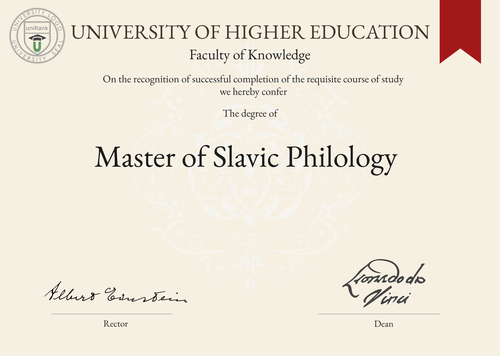
Master of Slavic Philology (MSP)
Guide to Master of Slavic Philology Program/Course/Degree
Master of Slavic Philology (MSP)

Program Name:
Master of Slavic PhilologyProgram or Degree abbreviation:
MSPDuration range:
The duration of the Master of Slavic Philology program typically ranges from 1 to 2 years, depending on the country and university.Tuition range:
The tuition fees for the Master of Slavic Philology program can vary significantly depending on the country and university. It is recommended to check with specific institutions for accurate information.Overview:
The Master of Slavic Philology program is designed to provide students with an in-depth understanding of Slavic languages, literature and culture. It aims to develop advanced linguistic and literary analysis skills, as well as critical thinking and research abilities.Curriculum Overview by year:
The curriculum of the Master of Slavic Philology program is structured to cover various aspects of Slavic languages, literature and culture. The specific courses offered may vary by university, but typically include: Year 1: - Introduction to Slavic Linguistics - Slavic Literature and Literary Theory - Comparative Slavic Literature - Slavic Folklore and Mythology - Research Methods in Slavic Studies Year 2: - Advanced Slavic Linguistics - Special Topics in Slavic Literature - Slavic Cultural Studies - Slavic Sociolinguistics - Master's ThesisKey Components:
The key components of the Master of Slavic Philology program include: - Intensive study of Slavic languages, focusing on grammar, syntax, phonetics and morphology. - Analysis and interpretation of Slavic literary works, including novels, poetry, drama and folklore. - Exploration of Slavic cultural and historical contexts. - Research and critical thinking skills development. - Master's thesis project.Career Prospects:
Graduates of the Master of Slavic Philology program can pursue various career paths, including: - Academic research and teaching in Slavic languages, literature, or cultural studies. - Translation and interpretation services. - Publishing and editing. - Cultural organizations and institutions. - Journalism and media. - Government and diplomatic services.Salary Expectations:
Salary expectations for graduates of the Master of Slavic Philology program can vary depending on factors such as job position, location and level of experience. It is advisable to research specific career paths and industries for accurate salary information. For a more accurate understanding of salary expectations, you can utilize the Job Sites Search Engine, from our sister site jobRank, which searches over 4,600 job sites worldwide. Make sure to specify not only the job title but also the country you are interested in.Conclusions:
It is important to note that the duration, tuition fees, curriculum, key components, career prospects and salary expectations of the Master of Slavic Philology program can vary depending on the chosen country or location of study, as well as the chosen university. Prospective students are encouraged to explore different options and consider their individual preferences and goals. Visitors can search for institutions offering the Master of Slavic Philology program worldwide through the uniRank World Universities Search Engine for more information on specific universities and their offerings.World Universities Search Engine
search for Master of Slavic Philology (MSP) and add the Location (country, state etc.) or specific University you are interested in studying at.
Query examples:
- Master of Slavic Philology (MSP) United States
- Master of Slavic Philology (MSP) United Kingdom online
- Master of Slavic Philology (MSP) Australia international students
- Master of Slavic Philology (MSP) University of California
- Master of Slavic Philology (MSP) University of London tuition fees
- Master of Slavic Philology (MSP) University of Sydney scholarships
Share Program/Course
Interesting? Share this program/course/degree info with your friends now.